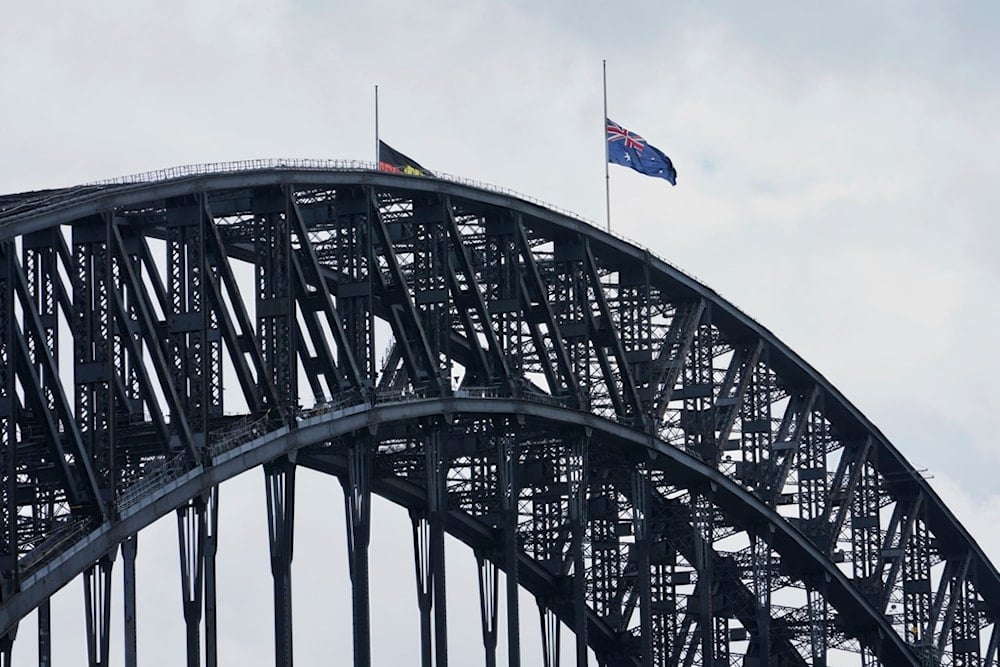Court clears massive pro-Palestine March on Sydney Harbour Bridge
A New South Wales court has authorized a large pro-Palestine march across the Sydney Harbour Bridge, granting protesters legal protection despite earlier police opposition and anticipated disruptions.
-

Flags fly at half mast atop of the Sydney Harbour Bridge following the death of Pope Francis, in Sydney, Australia, Tuesday, April 22, 2025. (AP Photo/Rick Rycroft)
Tens of thousands are expected to flood Sydney's Harbour Bridge this Sunday after the New South Wales Supreme Court granted legal protection to a planned pro-Palestine march, despite earlier police objections.
Justice Belinda Rigg ruled in favor of the Palestine Action Group, affirming the protest's legitimacy and allowing the event to proceed with legal safeguards. "The march at this location is motivated by the belief that the horror and urgency of the situation in Gaza demands an urgent and extraordinary response from the people of the world," she stated in her judgment. "The evidence indicates there is significant support for the march."
The Harbour Bridge will be closed to vehicles for approximately five hours starting at 11:30 a.m., while public trains are expected to continue operating. Authorities are bracing for major disruptions across central Sydney as a result.
Police had initially denied the group's application, citing the short notice and concerns over public safety, including the possibility of crowd crushes and the lack of a traffic management plan. But the court's ruling overruled that decision, effectively authorizing the protest and providing participants with legal cover under the Summary Offences Act. This includes immunity from charges such as traffic obstruction.
Organizers welcomed the outcome, calling it a landmark victory. "This will be an enormous, family-friendly, and safe event for everyone. The police are now working with us," the Palestine Action Group declared online, describing the march as an "immense march for humanity."
Urgent Response
The protest is expected to denounce "Israel's" ongoing military campaign in Gaza and the worsening humanitarian crisis. Josh Lees, a spokesperson for the organizing group, argued in court that the march would serve as "an urgent and massive response" to the situation. Justice Rigg concurred, "The public interest in freedom of expression, at this time, in the manner contemplated, for the reasons advanced, is very high."
She further noted that public inconvenience alone could not be used to suppress political demonstrations. "If matters such as this were to be determinative, no assembly involving inconvenience would be permitted," Rigg said. "To deprive such groups the opportunity to demonstrate in an authorised public assembly would inevitably lead to resentment and alienation."
Rigg also rejected claims that her decision would justify violence or prevent emergency services from operating. "This decision should not be read as condoning antisocial behaviour or ambulances not getting to hospital on time," she clarified.
Read more: Australia police pepper-spray 13 y/o during Lebanon-Palestine protest
Police Prepared
NSW Police Deputy Commissioner Peter McKenna confirmed officers are shifting from opposition to logistical support. "We don't get into the politics," he said. "We enforce the law of the day and tomorrow these protests have been deemed authorised, so we will police it in that respect."
He said police units, including riot control, mounted divisions, and traffic patrol, will be deployed to maintain order. "Nothing changes for us in the fact that [if] people … come in to do the right thing and have a safe protest, then we will facilitate that … we will work with them," McKenna added. "But if people come in to commit any type of offences, antisocial behaviour, or anything else that puts public safety at risk, we will have no hesitation to take action."
Yasmin Catley, NSW's police minister, acknowledged the court's ruling. "Police, we believe, will be able to handle the protest on the bridge tomorrow, so long as people are peaceful, that they listen to what the police ask them to do," she said. "But make no mistake, there is going to be massive, massive disruption. So our message is, avoid the city if you can."
Conditional Freedoms
Legal experts noted the decision does not grant unrestricted freedom for protesters. David Mejia-Canales from the Human Rights Law Centre explained that authorization "doesn't give people the ability to engage in all types and all forms of activism." He stressed the importance of adhering to organizer and marshal instructions.
Under Australian law, protest rights are not explicitly enshrined in NSW statutes, but courts have recognized them as part of the implied constitutional right to political communication.

 4 Min Read
4 Min Read










